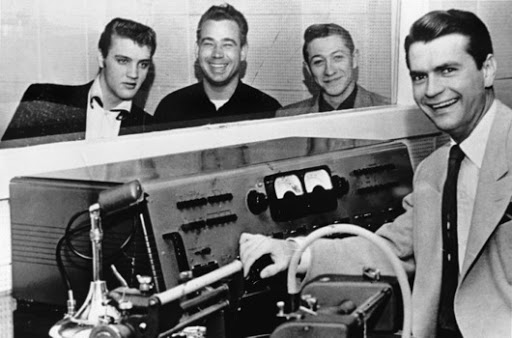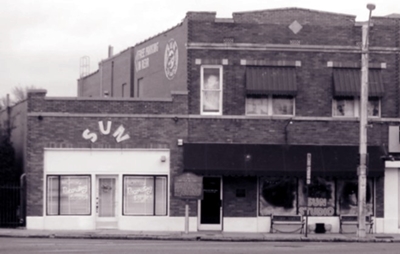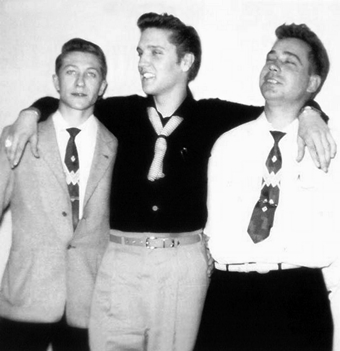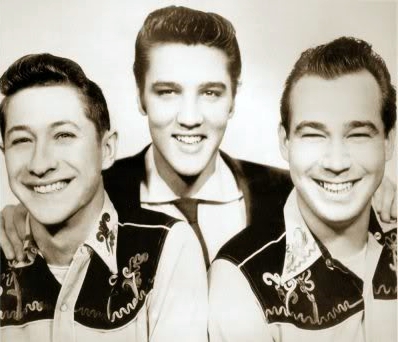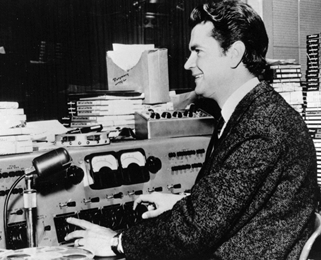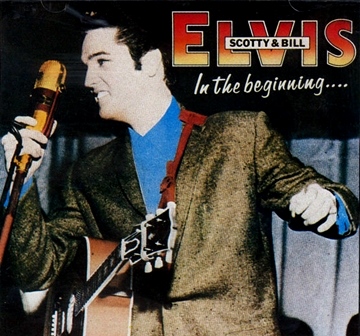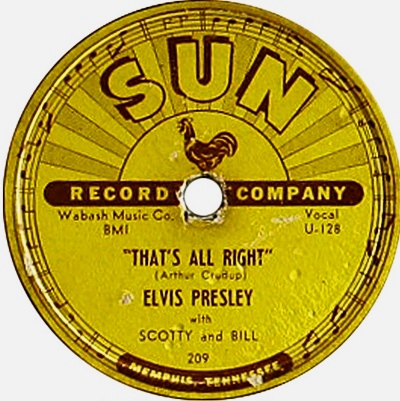 |
 |

706 UNION AVENUE, MEMPHIS, TENNESSEE MONDAY 5th JULY 1954 was the longest working day of Elvis Presley's life. A thousand times he glanced at his watch, willing his shift to be over. When the whistle finally blew, he rushed home, took a shower, combed his hair twice, changed his clothes and, guitar in hand, left in time to arrive at 706 Union before 7:00 PM.
Sam reassured the boy that this evening was just going to be an informal session: Elvis would be putting a few songs on tape — this time with a couple of backing musicians — to see how it sounded. He positioned three microphones precisely, and gave each player instructions on where to stand. Sam placed Elvis nearest the control booth, but had him face away from the window, lest the producer's gaze un-nerve him further. Scotty and Bill formed the other two corners of the triangle, and all three looked in at one another, just six feet apart. Elvis and Bill checked their instruments against Scotty's beautiful bronze-finished Gibson ES295, which was always perfectly tuned for studio work. The conversation inevitably turned to repertoire, and a handful of songs were suggested and discarded: the challenge was to find something that all three musicians knew well and could play all the way through. Eventually, they settled on a most obscure selection: ‘'Harbor Lights”, a 1950 number one pop hit for The Sammy Kaye Orchestra. It was a mid-tempo ballad given a Hawaiian flavour by the use of steel guitar. As was the way of things, it had charted for several different artists, and the vocal line that Elvis had in his head was that of Bing Crosby's, no less. Elvis owned the Crosby single - he also loved the B-side, the similarly exotic Beyond the Reef" - and it was a song he'd sung often in his room, maybe even to Dixie. As they played a chord or two, Sam slipped into the control booth and cued up the Ampex. This being just a try-out session, he didn't bother setting the second machine, but decided to record the boys "dry", without echo. He started the tape rolling while they were still gently strumming, then silently caught their attention and nodded for them to begin. The first two takes didn't get past the guitar introduction, but the third was complete. Scotty's opening notes rang clear and true, capturing the balmy and still studio atmosphere. Elvis self-consciously crooned his way through the tune, throwing in a whistling section for good measure. The song ended, and Sam praised the boys, calling for another take at a slightly faster tempo. It was a tactic he often used, trying to catch the musicians by surprise. They obliged: Elvis played around with the words a little; Scotty - probably to Sam's annoyance - added a stream of over-complex guitar fills; Bill plunked on the first beat of each bar.
Sam suggested they try something else. Elvis listened while titles were tossed about. Pop numbers, hillbilly hits and ballads were all floated, but no one, not even Mr Phillips, talked about the blues. And why would they? White musicians in a Memphis studio - even a studio usually dedicated to black performers - were unlikely to know about, much less sing anything from, the R&B chart . Eventually, they chose Leon Payne's 1949 country hit “I Love You Because", a fiddle-led ballad, but Elvis' vocal line was inspired by Eddie Fisher's 1950 pop cover. As he had done with the first song of the evening, Elvis took his inspiration from the best singer. Sure, he knew the hillbilly version, but he matched himself against the smooth crooning of the pop artist rather than the pedestrian original. Sam changed tapes and they spent much of the next hour running through take after take of their new selection. Again, Elvis played with the words; sometimes he whistled; sometimes he tried a dramatic narration. Scotty, occasionally overplayed, but when he got it right it was beautiful. Bill still plunked on the beat. This pattern was repeated over and again with different songs as the minutes drifted slowly by. Sam grew impatient inwardly - although he would never allow his players to see any negative emotion - because he sensed the boy was holding back. There was something he wasn't revealing. Yes, he sang well, but Sam had already realised they didn't have the next Red Foley or Bing Crosby in the studio. Scotty, just three years older than Elvis but seeming decades more mature, was wondering why he was wasting a Monday night. Bill carried on plunking, knowing the session was heading nowhere.
No one felt the sense of frustration more keenly than him. The studio was silent. All evening he'd been following the general suggestions of pop and hillbilly tunes (which he genuinely loved, of course) - songs they'd all known how to play. Heck, he'd nominated some of the choices himself. But the conversation had never turned to the other side of the musical fence. At no point had Mr Phillips followed Elvis' carefully imagined but unlikely script: "Do you know any blues, son?" The hour was late. This was the session Elvis had been dreaming of for a year or even longer. And he knew that any minute now, Mr Phillips was going to call time and his big moment would be gone forever. Elvis had not wanted to expose himself or his musical tastes to people he barely knew. He hadn't wanted to risk potential ridicule. But, with the Blackwoods’ tragedy in mind, he sensed he stood at a crossroads and, inspired, made a decision. Seemingly out of the blue, Elvis started strumming his guitar rhythmically and loudly on an insistent A chord. Scotty and Bill looked up, surprised. Until now, Elvis had played slowly and quietly all evening. After a bar or two, Elvis sang the words, "Well, that's all right, now mama’. Bill laughed and leapt to his feet, amused by the catchy beat and, although he didn't recognise the song, grabbed his bass and started not plunking but slapping. Scotty - also unfamiliar with the tune - picked up his guitar, figured out the key and started filling in where he could.
The song abruptly stopped - although Bill, ever the clown, insisted on hitting a couple of extra notes - and the trio looked sheepishly at the producer, like children caught messing about by their father after lights out. "Ah, we're just fooling around, Mr Phillips," Elvis suggested, barely suppressing his stutter. Now, what Sam wanted to do was grab Elvis by the shoulders and shout, "Why have you been holding out on me? You should have told me you knew Crudup's stuff! What other blues do you know?" But what he actually did was to say, "Well, it sounds pretty good. Let’s back up, see if we can find a place to start over, and get it on tape." The boys looked at one another and shrugged. Elvis clarified he was playing A, D and E chords, then suggested it might be nice to have a guitar solo after the second verse. Sam meanwhile was furiously cueing up the Ampex, partly terrified that they'd be unable to recreate the magic in a formal take. Maybe he should have just recorded the jam. There was no time to set up the slapback: he needed to get this on tape now.
It didn't quite have the looseness of what he'd heard when the boys were jamming but, damn it, Sam knew they were almost there. "Sounds good! Now, Bill, you let Elvis have a little more space in the intro; don't jump in too fast. Scotty, I swear, if I'd wanted Chet Atkins on this session I would have flown him in from Nashville - keep it simple, son. Elvis, you're doing just fine. Maybe we can ease back a little on the tempo. Okay, let's try it again, just one more time for Sam." After hours of tension, there was suddenly a sense of grace and freedom in the cramped sweatbox of a studio. The boys were ready; Elvis was a ball of energy; Bill was chewing gum and smiling; Scotty was attentive and serious. Elvis hit the opening riff, clear and strong, with just the slightest drop in tempo, allowing the song to breathe. Bill jumped in perfectly, a beat later than previously — Sam was right; it worked much better this way. Scotty watched Elvis as the second bar of introduction came to an end, waiting for the vocal to kick in, so he could feed off his lines. But Elvis didn't come in as scheduled and Sam's heart skipped a beat. The riff kept going for an extra half a bar before Elvis, now absolutely in command of the song and teasing the band, started in with the lyric. And Sam loved this — it was different! It would catch the listener by surprise. The performance swung beautifully, but Sam stood quite motionless throughout the take. He didn't want anything to interrupt the moment. Scotty found the ideal balance between complexity and simplicity, and his guitar solo perfectly complemented Elvis' singing. Bill drove the song along, giving it the essential bounce and lightness of touch. But it was Elvis who was the catalyst. His acoustic guitar playing had, up until now, been a handicap. But suddenly, it was the glue that held everything together. And his vocals were a revelation. This was an adult song about a failing relationship, and Elvis sang it like a bird. He brought together the lust of Jimmie Rodgers and the piety of the Carters, all in a single performance. Just two minutes after the song had begun Elvis rang the final note and stood absolutely still, waiting for the all clear from Mr Phillips. When it came, the players laughed and relaxed. Sam was exhilarated. For the first time, he'd captured the spirit of his black artists through a white band. But Elvis wasn't simply a white boy singing the blues: he was a poor young Southerner singing in a way that made barriers and divisions irrelevant. They listened to the playback and self-consciously mocked their own performances. It began to occur to Scotty and Bill that they'd actually played on a blues. When the tape ended, the boys stopped laughing and a tense silence filled the small room. One voice wondered whether it'd be allowed to be played on radio. After another short silence, the answer came back, "Good God, they'll run us out of town." Sam sent the boys home, although none of them would be able to sleep that night. Elvis walked on air all the way. Scotty drove Bill and their instruments back to Belz. Sam stayed in the booth and played the song again. It was black, white, country, blues, gospel and pop all mixed together. But overall, and most importantly, it was the sound of youth. American popular music of all genres was dominated by singers who were in their late twenties and beyond. Why? Because it took so damn long to make a break-through, to get a record contract, to get on the radio, to achieve recognition. He wondered to himself again why the boy hadn't told him he knew blues songs. But, in truth, Sam entirely understood Elvis' need for discretion. One tended not to talk about these things - hell, even with Dewey he skirted around the obvious conversation - but he felt sure he'd found a white boy who was not only non-prejudiced, but who also adored black culture as much as he did. He knew they'd achieved something truly special, but wasn't at all sure what was going to happen next. He put the tape in a Scotch box and left it on his desk in the booth. He locked up, then made his own way home, thinking to himself, "Imagine a kid like that knowing Crudup." The following morning, Sam, Scotty and Bill would all tell the same tale to their wives over breakfast "... and then, out of nowhere, this crazy boy just started singing this song." And that's the story everyone, including Elvis, told from that point on.
Spotlight by Tony Pews. Go here to Amazon UK to read a sample of 'Walk A Lonely Street' Go here to 'Walk A Lonely Street' website for more information, stories and other AMAZON purchase links
EIN Website content © Copyright the Elvis Information Network.
Elvis Presley, Elvis and Graceland are trademarks of Elvis Presley Enterprises. The Elvis Information Network has been running since 1986 and is an EPE officially recognised Elvis fan club.
|
|

